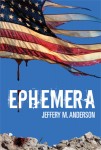Although the seeds were planted earlier, dystopian literature has flourished in 20th century nutrients — the rise of fascism, ideological conflicts, global industrialization, and seemingly limitless advances in technology. Pessimism isn’t a prerequisite to realize there is a potentially detrimental synergy in the coalescence of these changes. It undoubtedly provides plenty of opportunity to envision a future that may be more hellish than heavenly.
 It’s from ground like this that an America a couple decades from now arises in Jeffery M. Anderson’s Ephemera. Having gone through recession, depression, collapse of its monetary system, and reorganization of its political structure, this is a society where people focus — or are led to focus — on the ephemera of life. City streets are flooded with digital advertisements, whether cast on the sidewalk, on air blimps or audio directed at passers-by. People can earn merchandise or credits, the basis of the monetary system, by working specific products into conversations with others. Urbanites walk down the street wearing “Web shades,” glasses with one opaque lens displaying a satellite feed to the Internet “for endless entertainment in the seconds between life’s other entertainments.” News reports occasionally mention substantive items, such as the continuing wars in Iraq and Afghanistan, but even they fall by the wayside for important events such as the finals of of America’s Toughest Wrestler.
It’s from ground like this that an America a couple decades from now arises in Jeffery M. Anderson’s Ephemera. Having gone through recession, depression, collapse of its monetary system, and reorganization of its political structure, this is a society where people focus — or are led to focus — on the ephemera of life. City streets are flooded with digital advertisements, whether cast on the sidewalk, on air blimps or audio directed at passers-by. People can earn merchandise or credits, the basis of the monetary system, by working specific products into conversations with others. Urbanites walk down the street wearing “Web shades,” glasses with one opaque lens displaying a satellite feed to the Internet “for endless entertainment in the seconds between life’s other entertainments.” News reports occasionally mention substantive items, such as the continuing wars in Iraq and Afghanistan, but even they fall by the wayside for important events such as the finals of of America’s Toughest Wrestler.
Government, meanwhile, reflects (or creates) society. The country’s first female president is little more than a figurehead, elected to office by reflecting and massaging public opinion. Real power rests in the hands of Secretary of Commerce Linus Stillman, who has been a mover and shaker in government since Ronald Reagan’s second term. The cabinet includes a Secretary of Advertising, tasked with representing the interests of advertising companies, and a Secretary of Media, who represents the interests of the country’s two media conglomerates. Media and advertising are the opiates of the masses.
Anderson’s protagonist is Nester Cab, a 38-year-old writer for The Reviewer’s Review. Rather than review movies, books and music, the magazine reviews those who review such items. As unlikely a candidate as he might be, Cab embarks on a search for a soldier after a mysterious message is left at his desk. Cab’s search brings him in contact with the Neo-Luddite Army, a grassroots protest group that seems to be growing more violent. The NLA essentially kidnaps Cab to convince him of the truth of its evidence of massive government conspiracies. The NLA’s leader clearly has psychological problems, adding to Cab’s concern over whether he can believe the organization. Yet NLA’s leader and members, Stillman’s supporters or Aida, Cab’s closest friend, never really reached the level of fully realized characters. Cab and Stillman are by far the most developed characters and, oddly, the antagonist, Stillman, is easier to grasp than Cab.
As its name indicates, the NLA is wary of the mind-numbing effects of certain technology but its true ideological roots seem akin to the Tea Party. “We were never meant to have full-time, ever-growing bureaucracy whose sole intent is to constantly crank out new limits on us,” one NLA member tells Cab. Likewise, the NLA’s almost inadvertent leader says it “uncovered the modern patriots. Conversations evolved from excessive property taxes to reclaiming the federal government.” Although far from as politically motivated or direct, the political foundations of the NLA and the government-driven conspiracies means Ephemera may bring last year’s novel by Glenn Beck to the mind of somewhat politically attuned readers.
Anderson, though, deserves credit for not expressly espousing or endorsing any particular political viewpoint. The dystopia is not shaped by aspects of society that concern only one end of the political spectrum. You can find elements that concern each side and, in fact, the book may suggest that, at times, the extreme ends are more closely aligned than they might think. Somewhat inconsistent pacing keeps Ephemera from a page-turning thriller. Still, Anderson hides the ball well enough that the reader remains intrigued about exactly what Stillman has up his sleeve and the purpose of some of the deceptions the NLA uncovered. This helps maintain the tension between who is wearing the white hats and who the black hats. Both sides are sufficiently gray throughout the novel, although when the ultimate plot is unveiled it is akin to that of a James Bond villain and one wonders about just how and why we got there.
Ephemera is a workmanlike dystopian set piece that finds a credible basis in modern America, particularly public infatuation with ephemera and diversions over substance and reality. While an entertaining read, it is ultimately unlikely to make anyone’s list of the best dystopian novels of the last decade or two.
When we bore people and the press to death with rhetoric, we can disguise anything significant within that rhetoric, and no one will notice.
Jeffery M. Anderson, Ephemera







